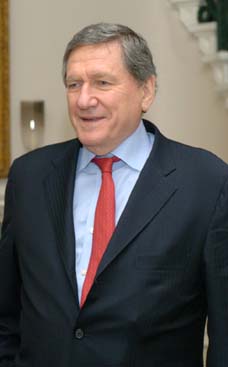
Raised in working-class Lynn, Mass. by Irish immigrant parents with eighth-grade educations, McWalters studied philosophy and history at Boston College. His siblings and first cousins, 12 in all, went to college. After BC, he taught English in the Philippines with the Peace Corps. When he returned to the United States, he worked as a middle school social studies teacher in Rochester. McWalters earned a master’s in public administration but “never intended to get into school administration,” he says. A stint planning a magnet school and another working in planning and budgeting swayed him, and he eventually earned a certificate in educational administration.
Philippines RPCV Peter McWalters reflects on 17 years of trying to fix schools in Rhode Island
RI Education chief reflects on 17 years of trying to fix schools
01:00 AM EDT on Sunday, March 29, 2009
By Jennifer D. JordanJournal Staff writer
Literacy coaches helping high school kids to read.
Teachers compelled to know their students and talk with them every day.
High school seniors engaged in projects that prove they can apply what they’ve learned in real world settings.
None of these changes would be in place in Rhode Island schools were it not for departing Education Commissioner Peter McWalters.
In 1992, McWalters inherited a floundering public school system where the longer some students stayed in school, the less they learned.
Student test scores lagged behind national averages. Seniors were graduating without being able to read, write and compute. Thousands of kids dropped out.
The education system “has always worked for some students and it continues to work for some students,” McWalters said back then. “It has never worked for some students, and it continues not to work for them.”
Addressing that injustice has defined McWalters’ tenure. As he prepares to step down June 30, after more than 17 years, some say he has succeeded in highlighting the state’s obligation to educate every child to the highest possible level, a fundamental shift in focus. Others question why McWalters’ vision has not resulted in even greater achievement gains by students, many of whom continue to trail in educational measures. Critics wanted quicker results rather than the incremental progress McWalters has achieved. This growing frustration likely forced his departure a year or two earlier than expected.
McWalters himself struggles with why improvement has taken so long.
“It’s not the wrong strategy but there is impatience,” McWalters, 62, says. “We are still losing too many kids. How do you do it faster than I was able to do it? I wish I could have done it faster.”
McWALTERS CAME to Rhode Island with his wife, Alice, and three daughters, fresh from a successful superintendency in Rochester, N.Y.. There he worked with the teacher union to develop a contract that paid individual teachers more in exchange for improved student performance — merit pay –– a breakthrough that brought him national attention.
Raised in working-class Lynn, Mass. by Irish immigrant parents with eighth-grade educations, McWalters studied philosophy and history at Boston College. His siblings and first cousins, 12 in all, went to college.
After BC, he taught English in the Philippines with the Peace Corps. When he returned to the United States, he worked as a middle school social studies teacher in Rochester.
McWalters earned a master’s in public administration but “never intended to get into school administration,” he says. A stint planning a magnet school and another working in planning and budgeting swayed him, and he eventually earned a certificate in educational administration.
His daughters attended Providence schools. When speaking with parents, McWalters often mentions his youngest daughter who shares his learning disability — dyslexia –– and who graduated from Classical High School and the University of Rhode Island.
From the start, he spread his mantra, “The All Kids Agenda,” an insistence that all students, regardless of race, economic background or innate ability, deserve to be taught to the highest possible level.
“We forget now that everyone talks about all kids reaching high standards and college readiness, but those words were not on the tip of everyone’s tongue in the early 1990s. But they were on Peter’s,” said Colleen Callahan, a member of the Board of Regents for Elementary and Secondary Education and a director for the Rhode Island Federation of Teachers. “He has been relentless on the all-kids agenda and he brought us along with him.”
MCWALTERS GOT the go-ahead to turn his “all kids” message into tangible form in 1997 when the General Assembly passed an education law, referred to as Article 31. It gave the commissioner more authority and state money to back it up.
The law required public reporting about how schools were faring. For the first time, parents and taxpayers were swamped with information about their schools and the progress, or lack thereof, that different groups of students — poor, black, Hispanic and students with special needs — were making. And money flowed directly to areas in need of improvement: reading, urban schools, early childhood education.
The arrival of the 2001 federal law No Child Left Behind accelerated McWalters’ efforts.
Even as McWalters and state Department of Education exposed failing schools throughout the state, they pushed to raise the bar for everyone. Their reforms demanded a higher level of teaching and a greater degree of learning.
McWalters and staff embarked on years of painstaking, unglamorous work to establish what students at each grade level should be learning in English, math, science, social studies and the arts.
Then teachers from Rhode Island, New Hampshire and Vermont helped to design a series of tests that gauged whether, in fact, students were being taught the required content and skills.
The department also developed a new vision for middle and high school education. Concepts like “advisories” and “common planning time” began to seep into McWalters’ speech. Today secondary schools must ensure that teachers interact with a group of students every day and teachers from different disciplines must meet weekly to share information that helps them do their jobs better.
Students, too, are required to do more. Through projects and portfolios, students must demonstrate they have mastered key skills and subjects. And, teachers must help them clear this higher hurdle.
The new requirements mean that “no student will ever again walk across a stage to receive a diploma who cannot read, write or perform math,” McWalters says.
WHILE PROGRESS has been too slow, in McWalters’ mind, he remains convinced that getting things done through consensus is far better than using a heavy hand.
That’s why he has reached out to include teachers each step along the way as he pushed for profound changes in the way they taught, what they taught, and how they related to students.
But building agreement takes time, sometimes years.
Sparse financing has, at times, imperiled his efforts. McWalters does not complain much, despite the fact that recently, state support has either held steady or dipped, even as costs rise, and his department has sustained deep staff and program cuts.
Results are only now beginning to emerge.
Test scores have begun to show steady improvement, especially among low income, minority and urban students. The state has received national praise for its regional tests and its diploma requirements. A new, more honest method of tracking students shows Rhode Island is graduating more students, even after raising the bar.
McWalters resisted high-stakes testing as the sole factor in determining who graduates. Instead, Rhode Island’s three-pronged approach requires that students complete four years of classes, take standardized tests, and submit projects and portfolios.
“Rhode Island held onto those designs against tremendous pressure to drop them, and now the state is considered a national model,” says Gene Wilhoit, executive director of the Council of Chief State School Officers in Washington, D.C.
A YEAR AGO, Robert G. Flanders Jr., the chairman of the Board of Regents, expressed frustration with the pace of improvement when he announced that McWalters’ contract would be extended only six months, to June of this year.
“We are far from getting into the Promised Land in terms of where K-12 education is concerned and we need a new leader who will get us there,” Flanders said.
This month, Flanders struck a different tone. He said the state is on the right track to significantly improve student achievement, as indicated in the latest round of test scores. He praised McWalters for not backing down in his determination to raise the bar.
McWalters, reflecting on nearly two decades of laying the foundation to improve education for all students, still wonders why it has taken so long.
He says he may have underestimated how arduous transforming schools can be, and how painful change is.
Improving schools “is more than just an aspiration. The first act is one of political will,” McWalters said. “And then the hard work starts. You have to figure out how to do it.” That has taken Rhode Island — and many other states — years to figure out, he says.
“We have come a long way, but I don’t think we’ve won the battle,” he said. “I was part of the ignorance. I thought if you could just get teachers in a room to agree, they would go out and do it. But they also have their own ignorance. How do you use data? How do you improve instruction? So the machinery of changing people — it’s not just goodwill. It’s hard work.”
McWalters is unsure what he will do next.“He’s recognized as one of the top talents in the country right now,” Wilhoit said. “Someone will be getting a treasure.”
Elizabeth Burke Bryant, executive director of Rhode Island Kids Count, serves as a member of the search committee charged with finding McWalters’ replacement. She hopes the new commissioner will build on McWalters’ foundation and share his passion for helping students.
“He’s the kind of person who, when he wakes up in the morning and goes to bed at night, is thinking about the kids we are still leaving behind.”











